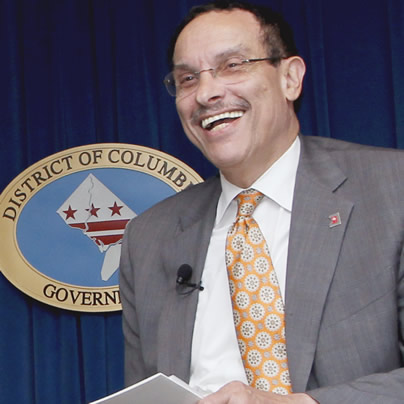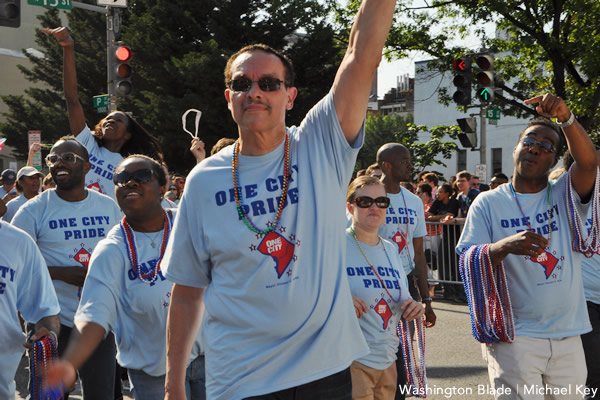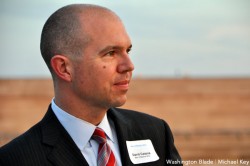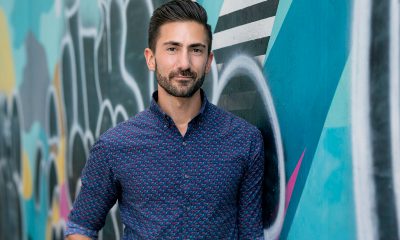Local
D.C. activists seek to ‘build on victories’ in 2014
Mayoral contest could pit Gray against Catania


Mayor Vincent Gray announced late last year that he would seek re-election. The primary is slated for April 1. (Washington Blade photo by Michael Key)
LGBT activists in D.C. acknowledge that they live in a city that has had one of the nation’s strongest anti-discrimination laws protecting their community for more than 20 years, the city passed a same-sex marriage law in 2009, and virtually all elected officials strongly support LGBT equality.
With that as a backdrop, the Gay and Lesbian Activists Alliance last week released its 2014 Election Year Agenda for LGBT Equality in Washington, D.C., which, among other things, calls for more than a dozen policy initiatives and for the approval of five LGBT-related bills currently pending before the City Council.
In an announcement last week, GLAA said the 16-page policy document was used to formulate a questionnaire on LGBT issues that the group has sent to all candidates running in the April 1 D.C. primary for mayor and seats on the City Council, just as it has done in every city election since the early 1970s.
“We have won most of the policy reforms for LGBT equality, which is reflected in the title of this year’s policy brief, ‘Building on Victory,’” said GLAA President Rick Rosendall.
“What remains mostly falls into two broad categories – translating our model policies and laws into reality, especially for at-risk populations including LGBT youth and transgender persons, and remaining vigilant,” Rosendall said.
The issues covered in the five pending bills include:
• The Surrogacy Parenting Agreement Act, which calls for updating the city’s surrogate parenting law that gay rights attorneys have called archaic to add provisions to better enable same-sex couples to enter into surrogacy agreements.
• The Domestic Partnership Termination Recognition Amendment Act, which calls for changing D.C.’s existing domestic partnership law to enable couples that don’t live in D.C. to terminate their partnerships in a way that is recognized by courts in other states.
• The LGBTQ Homeless Youth Reform Amendment Act calls for, among other things, city funds to pay for beds reserved for LGBT youth in homeless shelters and other homeless facilities that activists say traditionally have not met the needs of LGBT or “questioning” youth.
• The Conversion Therapy for Minors Prohibition Act calls for prohibiting licensed therapists in the city from seeking to change the sexual orientation or gender identity of people under the age of 18 through so-called “conversion” therapy. Advocates for the legislation point out that virtually all professional mental health organizations have said the therapy is harmful to the mental health of those participating in such therapy, especially young people.
• The Marriage License Issuance Act calls for amending the city’s marriage law to eliminate the current mandatory, three-day waiting period for obtaining a marriage license. Marriage reform activists, both gay and straight, have called the waiting period requirement an unnecessary relic of the past.
The GLAA policy brief also calls for a requirement by city regulators and the mayor’s office that health insurance plans offered to D.C. government employees and the city’s Health Link insurance exchange program under the Obama administration’s Affordable Care Act include full coverage for sex reassignment surgery and hormone treatment for transgender people.
GLAA’s candidate questionnaires ask all candidates running for mayor and for the City Council to state whether they would support such a proposal.
“This is a huge priority in our community,” said Nico Quintana, senior organizer for the D.C. Trans Coalition.
Voters to choose among friends in election
Many LGBT activists have said that since nearly all of the candidates running this year for mayor and seats on the City Council have strong records of support on LGBT issues, LGBT voters will likely choose among them based on non-LGBT issues.
Mayor Vincent Gray, who some activists say has the strongest record on LGBT issues of any mayor in D.C. history, is being challenged by four members of the City Council, all of whom have expressed strong support for the LGBT community.
Council members Jack Evans (D-Ward 2), Muriel Bowser (D-Ward 4), and Tommy Wells (D-Ward 6) each have longtime records as strong supporters of LGBT equality. Council member Vincent Orange (D-At-Large), who opposed same-sex marriage when he ran for mayor in 2006, has said he changed his mind and has become a committed supporter of the city’s same-sex marriage law while continuing his support on all other LGBT-related issues.
Former State Department official Reta Jo Lewis and, Busboys and Poets Restaurant owner and businessman Andy Shallal have also expressed strong support for LGBT rights. The positions of lesser-known mayoral candidates Carlos Allen, a music promoter, Christian Carter, a businessman and civic activist, couldn’t immediately be determined.
Political observers say the LGBT vote, which surveys show will likely comprise at least 10 percent of the vote in the April 1 Democratic primary, could be a key factor in the outcome of the election.
But based on interviews with LGBT activists following the campaigns of the mayoral candidates, the LGBT vote will likely be divided among Gray and his City Council rivals, although many activists believe Gray remains highly popular in the LGBT community.

Council member David Catania (I-At-Large) has said he will enter the mayor’s race as an independent if Vincent Gray wins the primary and becomes the Democratic Party nominee. (Washington Blade file photo by Michael Key)
In looking beyond the primary to the November general election, gay D.C. Council member David Catania (I-At-Large) is being viewed as the wildcard of the 2014 mayoral race. Catania last fall formed an exploratory committee to consider whether to enter the mayoral race, knowing that as an independent he doesn’t have to file papers as a candidate until June, long after the winner of the Democratic primary is known.
In a development that startled some political observers, Catania told the Washington Post that he has already decided he will enter the race if Gray wins the primary and becomes the Democratic Party nominee.
In every mayoral election since the city obtained its home rule government in 1974, the Democratic Party nominee has won his or her race as mayor in the November general election. Catania, however, is telling potential supporters that this year is different and that the electorate is “tired” of politics of the past.
LGBT voters, who have long supported Catania in large numbers, could be faced with a dilemma if forced to choose between Gray and Catania, according to some LGBT advocates.
Next week: A preview of City Council races and the prospects for gay longtime Council member Jim Graham (D-Ward 1).
District of Columbia
Gay ANC member announces candidacy for Ward 1 D.C. Council seat
Community leader Brian Footer seeking seat held by Brianne Nadeau

Gay Advisory Neighborhood Commissioner Brian Footer, a community activist who has been involved for many years in local and national government affairs, has announced his candidacy for the Ward 1 D.C. Council seat up for election in 2026.
Footer, a Democrat, will be running in the city’s June 2, 2026, Democratic primary for the Ward 1 Council seat, but it is uncertain whether he will be running against incumbent Ward 1 Council member Brianne Nadeau (D). Nadeau has not yet announced if she plans to run for re-election for a fourth term following her 12 years on the Council.
Nadeau has been a longtime vocal supporter of the LGBTQ community.
If Footer were to win the primary and the November 2026 general election, he would become the Council’s second openly gay member. Ward 5 Council member Zachary Parker (D) is currently the 13-member Council’s only gay member.
Footer is a three-term ANC commissioner who currently serves as Chair of ANC 1E, which represents the city’s Adams Morgan neighborhood.
“Brian has worked at every level of government — federal, state, and local — building a career rooted in public service, aging policy, and inclusive urban planning,” a statement on his campaign website says.
“I’m running for Council because too many people in Ward 1 are doing everything right and still feel ignored by the city they call home,” Footer states on his website.
“I’m running because we can do better,” his statement continues. “That means making housing more affordable, addressing homelessness with real solutions, and keeping our neighborhoods safe with smart, community focused strategies.”
When contacted by the Washington Blade for comment, Nadeau said she was not ready at this time to discuss her plans about running again or about Footer’s candidacy.
“The primary is a ways away, and I’m very focused right now on the budget and the stadium deal and all the work that we’re doing at the Council,” she told the Blade. “So, I really haven’t had time to turn to my plans. So, as a result, I’m also not going to be commenting on anybody else who is determined that they’re running at this time.”
She first won election to the Council in 2014 after she defeated four-term gay Ward 1 Council member Jim Graham in the Democratic primary after Graham became embroiled in an ethics controversy.
In the 2022 Democratic primary Nadeau defeated gay challenger Salah Czapary in a three-candidate race, by a margin of 48.5% of the vote compared to Czapary’s 30.9%.
With the third candidate, Sabel Harris, receiving 20.4%, the outcome showed that the two challengers had a combined total vote count higher than Nadeau.
Further details of Footer’s candidacy can be accessed from his campaign website, brianfooterdc.com.
District of Columbia
Gay GOP group hosts Ernst, 3 House members — all of whom oppose Equality Act
Log Cabin, congressional guest speakers mum on June 25 event

U.S. Sen. Joni Ernst (R-Iowa) and three women Republican members of the U.S. House appeared as guest speakers at the June 25 meeting of Log Cabin Republicans of D.C., the local chapter of the national LGBTQ Republican group with that same name.
The U.S. House members who joined Ernst as guest speakers at the Log Cabin meeting were Celeste Maloy (R-Utah), Kat Cammack (R-Fla.), and Julia Letlow (R-La.).
Neither D.C. Log Cabin Republicans President Andrew Minik nor spokespersons for Ernst or the three congresswomen immediately responded to a request by the Washington Blade for comment on the GOP lawmakers’ appearance at an LGBTQ GOP group’s meeting.
“Please join us for an inspiring evening as we celebrate and recognize the bold leadership and accomplishments of Republican women in Congress,” a D.C Log Cabin announcement sent to its members states.
“This month’s meeting will highlight the efforts of the Republican Women’s Caucus and explore key issues such as the Protection of Women and Girls In Sports Act and the broader fight to preserve women’s spaces in society,” the message says.
It was referring to legislation pending in Congress calling for banning transgender women from participating in women’s sports events.
According to media reports, Ernst and the three congresswomen have expressed opposition to the Equality Act, the longstanding bill pending in Congress calling for prohibiting discrimination based on sexual orientation and gender identity in the areas of employment, housing, and public accommodations.
The Log Cabin announcement says the meeting was scheduled to take place at the Royal Sands Social Club, which is a restaurant and bar at 26 N St., S.E. in the city’s Navy Yard area.
D.C. Log Cabin member Stuart West, who attended the meeting, confirmed that Ernst and the three congresswomen showed up and spoke at the event.
“It was a good turnout,” he said. “I would definitely say probably 30 or 40 people attended.” West added, “Four women came to talk to a group of mostly gay men. That’s something you don’t see very often.”
District of Columbia
D.C. police seek public’s help in July 5 murder of trans woman
Relative disputes initial decision not to list case as hate crime

D.C. police are seeking help from the public in their investigation into the murder of a transgender woman who they say was shot to death at about 12:30 a.m. on Saturday, July 5, on the 2000 block of Benning Road, N.E.
But the police announcement of the fatal shooting and a police report obtained by the Washington Blade do not identify the victim, 28-year-old Daquane ‘Dream’ Johnson of Northeast D.C., as transgender. And the police report says the shooting is not currently listed as a suspected hate crime.
It was local transgender activists and one of Johnson’s family members, her aunt, who confirmed she was transgender and said information they obtained indicates the killing could have been a hate crime.
“On Saturday, July 5, at approximately 12:51 a.m., Sixth District officers were flagged down in the 2000 block of Benning Road, Northeast, for an unconscious female,” a July 5 D.C. police statement says. “Upon arrival, officers located an adult female victim suffering from gunshot wounds,” it says.
“D.C. Fire and EMS responded to the scene and transported the victim to a local hospital where after all lifesaving efforts failed and the victim was pronounced dead,” the statement says.
A separate police flyer with a photo of Johnson announces an award of $25,000 was being offered for information leading to the arrest and conviction of the person or persons responsible for the murder.
The flyer identifies D.C. police Homicide Detective Natasha Kennedy as being the lead investigator in the case and says anyone with information about the case should contact her at 202-380-6198.
Longtime D.C. transgender rights advocate Earline Budd told the Blade that one of the police investigators contacted her about the case and that she also spoke to Detective Kennedy. Budd said police confirmed to her that Johnson was a transgender woman.

One of Johnson’s family members, Vanna Terrell, who identified herself as Johnson’s aunt, told the Blade that Johnson used the first name of Dream and had planned to legally adopt that name instead of Daquane but had not gotten around to doing so.
Terrell said she and other family members learned more about the incident when one of two teenage high school students who knew Johnson’s brother contacted a friend and told the friend that they recognized Johnson as they witnessed the shooting. Terrell said the friend then called her to tell her what the friend learned from the two witnesses.
According to Terrell, the witnesses reportedly saw three men approach Johnson as Johnson walked along Benning Road and one of them called Johnson a derogatory name, leading Terrell to believe the men recognized Johnson as a transgender woman.
Terrell said one of the witnesses told the friend, who spoke to Terrell, that the man who shot Johnson kept shooting her until all of the bullets were fired. Budd, who said she spoke to Terrell, who also told her what the witnesses reported, said she believed the multiple shots fired by the shooter was an “overkill” that appears to have been a hate crime. Terrell said she too believes the murder was a hate crime.
In response to an inquiry from the Blade, Officer Ebony Major, a D.C. police spokesperson, stated in an email, “At this point there is nothing in the investigation that indicates the offense was motivated by hate or bias.”
Terrell said a memorial gathering to honor Johnson’s life was scheduled to be held Saturday, July 12, at River Terrace Park, which is located at 500 36th St., N.E. not far from where the shooting occurred.

-

 Federal Government2 days ago
Federal Government2 days agoTreasury Department has a gay secretary but LGBTQ staff are under siege
-

 Virginia3 days ago
Virginia3 days agoDefying trends, new LGBTQ center opens in rural Winchester, Va.
-

 District of Columbia2 days ago
District of Columbia2 days agoGay GOP group hosts Ernst, 3 House members — all of whom oppose Equality Act
-

 Opinions4 days ago
Opinions4 days agoUSAID’s demise: America’s global betrayal of trust with LGBTQ people










